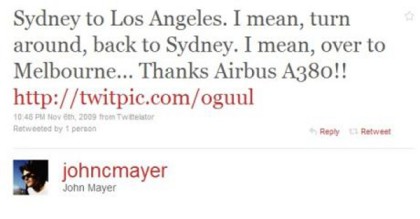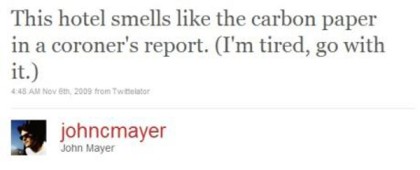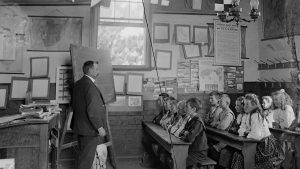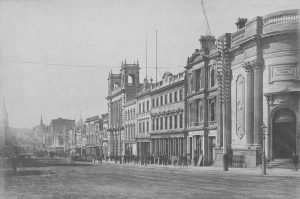John Mayer tweeted his adverse experience onboard a Qantas A380 flight yesterday and demonstrated the real time damage a single tweet  from Twitter
from Twitter  can cause an airline. Mayer was on board a LAX bound A380 service ex Sydney when fuel issues forced a return to Sydney, and was later diverted into Melbourne.
can cause an airline. Mayer was on board a LAX bound A380 service ex Sydney when fuel issues forced a return to Sydney, and was later diverted into Melbourne.
Mayer's initial tweet  showed a snapshot from the aircraft's In-flight Entertainment Sydney showing a diversion, and then he later tweeted
showed a snapshot from the aircraft's In-flight Entertainment Sydney showing a diversion, and then he later tweeted  his disdain with the hotel room Qantas provided for him (and 329 other passengers).
his disdain with the hotel room Qantas provided for him (and 329 other passengers).
"This hotel smells like the carbon paper in a coroner's report. (I'm tired, go with it.)" Mayer said.
Qantas wasn't specifically mentioned but the A380 was, so it's really uncertain who he was having a go at, but it doesn't really matter. Mayer has (at the the time of writing) over 3 million Twitter followers that read his dissatisfaction with the flight and the overnight accommodation. The negative tweets were followed up with adverse attention from traditional media and bloggers.
Regardless of whether organisations believe that celebrities deserve any kind of special treatment or not, their potential reach and influence has to (sadly) be considered. The immediacy of social media has created a marketing opportunity (or a PR nightmare) each time they reach for their iPhone. If Mayer were treated differently, perhaps his tweet would have commended Qantas on their handling of the diversion rather than resorting to whinging about the smell of the hotel room - potentially turning the negative situation into positive online exposure.
Qantas (Australia) doesn't have an established Twitter presence and are yet to fully embrace the global reach and marketing opportunities that Twitter (and other social services) has on offer... and I'm left with the impression that it'll take a major incident before they take the medium seriously.
Hopefully this incident (rather than something more serious) will encourage Qantas into establishing more of an online social presence.










